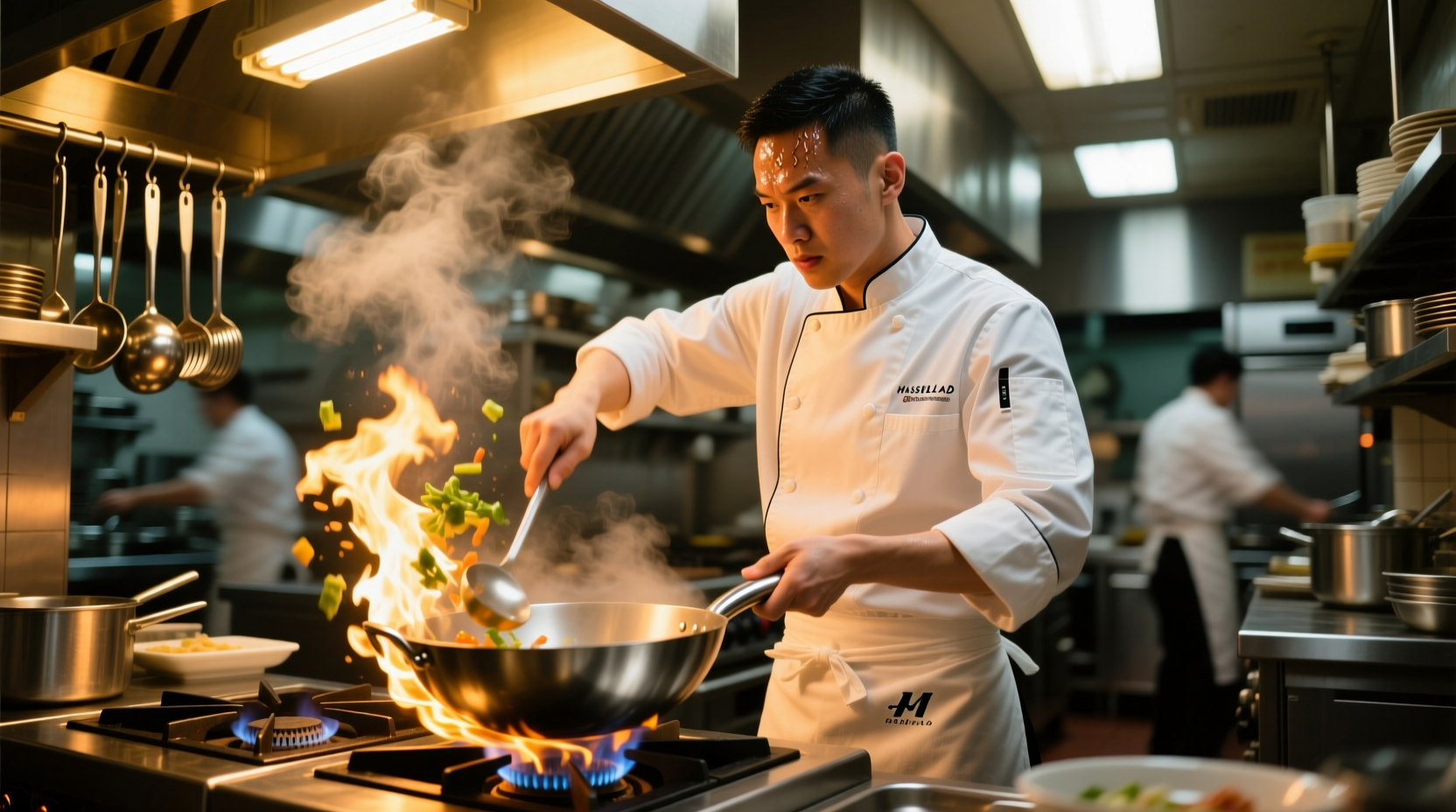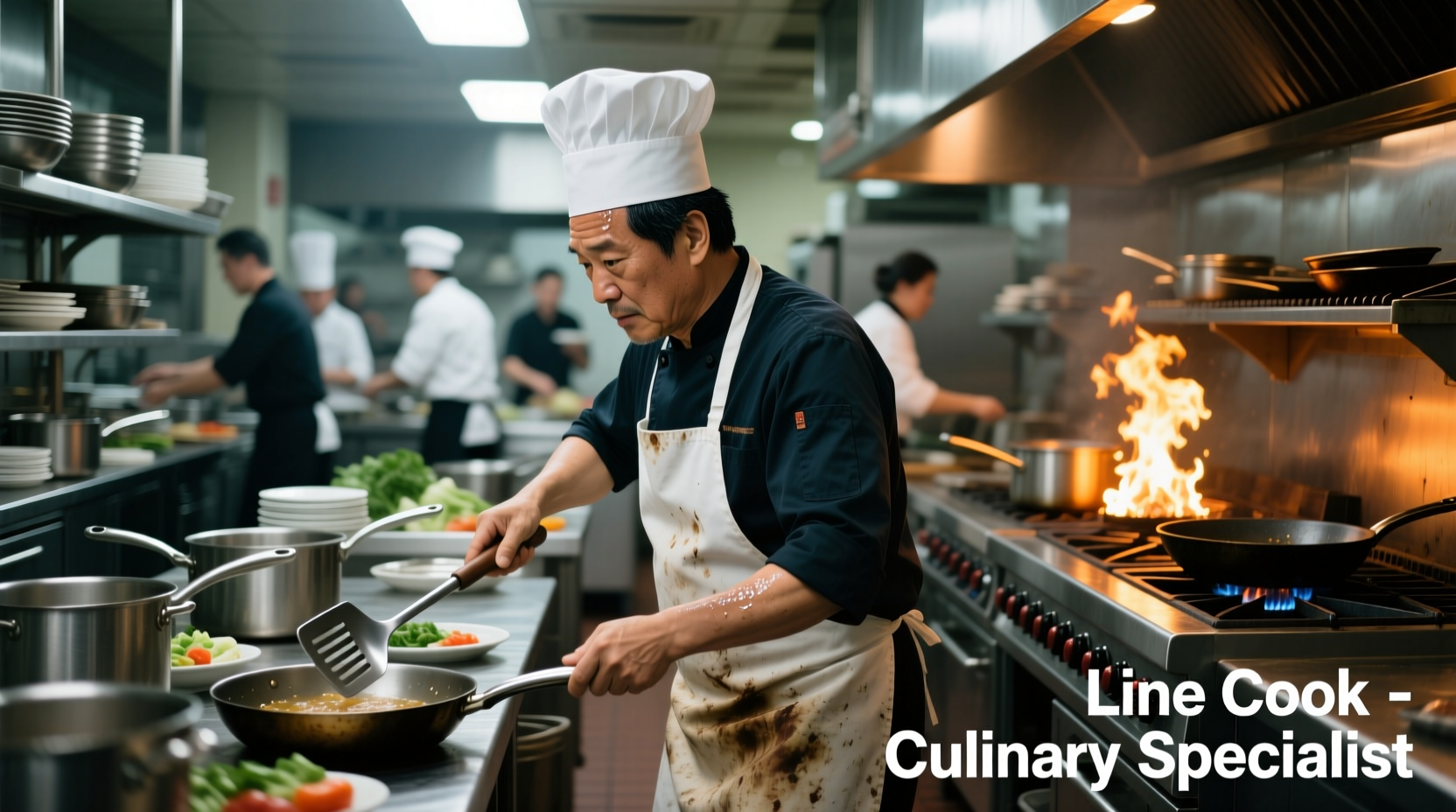Ever wondered what keeps a restaurant kitchen running smoothly during a busy dinner service? The line cook forms the backbone of professional culinary operations, working at specific stations to prepare menu items with precision and speed. Understanding this critical role reveals why line cooks are indispensable in hospitality, whether you're considering a culinary career or simply curious about how restaurants operate.
Defining the Line Cook Position
At its core, a line cook specializes in one or more specific cooking stations within a professional kitchen's brigade de cuisine system. Unlike prep cooks who handle ingredient preparation before service, line cooks are responsible for the actual cooking and plating of dishes during service hours. They work at designated stations such as:
- Grill ( Grillardin ) - meats, fish, vegetables
- Sauté ( Saucier ) - sautéed items and sauces
- Fry ( Friturier ) - fried foods
- Roast ( Rotisseur ) - roasted meats and gravies
- Vegetable ( Entremetier ) - vegetable dishes
- pantry ( Garde Manger ) - cold dishes, salads, and appetizers
Each station requires specialized knowledge and techniques, making line cooks true specialists within their assigned areas. During peak service times, they must maintain composure while working efficiently to ensure timely dish delivery without compromising quality.

Line Cook Responsibilities Breakdown
Line cooks perform a variety of critical tasks that keep restaurant operations running smoothly:
Pre-Service Preparation
- Conducting mise en place (organizing and preparing all necessary ingredients)
- Checking station inventory and communicating needs to management
- Ensuring all equipment is clean and functioning properly
- Reviewing daily specials and menu changes
During Service Execution
- Receiving and fulfilling orders from the point-of-sale system
- Preparing dishes according to standardized recipes
- Maintaining consistent food quality and presentation
- Managing multiple orders simultaneously during peak times
- Communicating effectively with servers and other kitchen staff
Post-Service Duties
- Properly storing leftover ingredients
- Cleaning and sanitizing workstations and equipment
- Reporting inventory levels for next day's preparation
- Documenting any issues with ingredients or equipment
| Kitchen Role | Primary Responsibilities | Experience Required | Reporting Structure |
|---|---|---|---|
| Line Cook | Station-specific cooking during service | Entry to mid-level culinary experience | Reports to sous chef or chef de partie |
| Prep Cook | Ingredient preparation before service | Minimal experience required | Reports to line cook or sous chef |
| Sous Chef | Kitchen management in chef's absence | 5+ years culinary experience | Reports directly to executive chef |
| Executive Chef | Menu development, kitchen leadership | 10+ years with management experience | Reports to restaurant owner/management |
Line Cook Career Path and Requirements
Becoming a line cook typically requires a combination of culinary education and hands-on experience. While some enter the field with just a high school diploma and on-the-job training, many pursue formal culinary education through:
- Culinary certificate programs (6-12 months)
- Associate degree in culinary arts (2 years)
- Apprenticeship programs combining classroom instruction with paid work experience
According to the U.S. Bureau of Labor Statistics, food preparation and serving occupations, including line cooks, are projected to grow 15 percent from 2022 to 2032, much faster than the average for all occupations. The median annual wage for line cooks was $29,420 in May 2022, with the highest 10 percent earning more than $41,000.
Successful line cooks typically possess these essential skills:
- Technical cooking abilities for their specific station
- Ability to work under pressure during busy service periods
- Knowledge of food safety and sanitation protocols
- Teamwork and communication skills
- Time management and organizational abilities
- Physical stamina for standing long hours
How Line Cook Roles Vary by Establishment
The specific responsibilities of a line cook can differ significantly depending on the type of restaurant:
- Fast Casual Restaurants: Often handle multiple stations due to smaller kitchen staff
- High-End Fine Dining: Specialize in one station with precise technique requirements
- Hotel Kitchens: May rotate through different stations to handle varied meal periods
- Catering Operations: Focus on large-batch cooking and efficient plating techniques
Understanding these context boundaries helps aspiring cooks target their job search to environments that match their skills and career goals. The American Culinary Federation notes that line cooks in fine dining establishments typically receive more specialized training but face higher pressure during service compared to those in casual dining settings.
Is Line Cooking the Right Career for You?
Before pursuing a line cook position, consider these realities of the profession:
Advantages
- Immediate entry into the culinary field with minimal requirements
- Hands-on learning in professional kitchen environments
- Clear career progression path to higher culinary positions
- Creative outlet for those passionate about food
Challenges
- Physically demanding work in hot, fast-paced environments
- Irregular hours including nights, weekends, and holidays
- Relatively modest starting compensation
- High-pressure situations during peak service times
Many professional chefs consider line cook experience essential for culinary development. "The line cook position is where you learn the fundamentals of professional cooking under fire," explains Chef Thomas Keller in his culinary guidebooks. "It builds the foundation for everything that comes after in a culinary career."
Transitioning Beyond Line Cook
Line cook positions serve as critical stepping stones in culinary careers. With experience, line cooks can advance to:
- Chef de partie (station chef with supervisory responsibilities)
- Sous chef (second-in-command in the kitchen)
- Executive chef (kitchen leadership and menu development)
- Specialized culinary roles like pastry chef or saucier
- Restaurant ownership or consulting positions
The National Restaurant Association reports that approximately 68% of executive chefs began their careers as line cooks, highlighting the importance of this foundational role in culinary career development.
Frequently Asked Questions
What's the difference between a line cook and a chef?
A line cook specializes in preparing specific menu items at a designated station during service, while a chef typically has broader responsibilities including menu planning, staff management, and kitchen leadership. Chefs generally have more experience and advanced culinary training compared to line cooks.
Do line cooks need culinary school training?
While culinary school provides valuable foundational knowledge, many line cooks enter the field through on-the-job training. Approximately 45% of line cooks have some culinary education, while others develop skills through apprenticeships and work experience in restaurant kitchens.
What are the typical working hours for a line cook?
Line cooks typically work during restaurant service hours, which often include evenings, weekends, and holidays. Shifts commonly range from 6-10 hours, with many line cooks working split shifts that include preparation time before service and cleanup after service ends.
How much can a line cook earn annually?
According to the U.S. Bureau of Labor Statistics, line cooks earned a median annual wage of $29,420 in May 2022. Salaries vary by location, with line cooks in metropolitan areas typically earning more. The highest 10 percent earned over $41,000, while top performers in fine dining establishments can earn significantly more with tips and bonuses.
What skills are most important for line cooks?
Essential line cook skills include technical cooking abilities for their station, time management, food safety knowledge, ability to work under pressure, physical stamina, and effective communication. Successful line cooks also demonstrate reliability, attention to detail, and the capacity to follow standardized recipes consistently.











 浙公网安备
33010002000092号
浙公网安备
33010002000092号 浙B2-20120091-4
浙B2-20120091-4